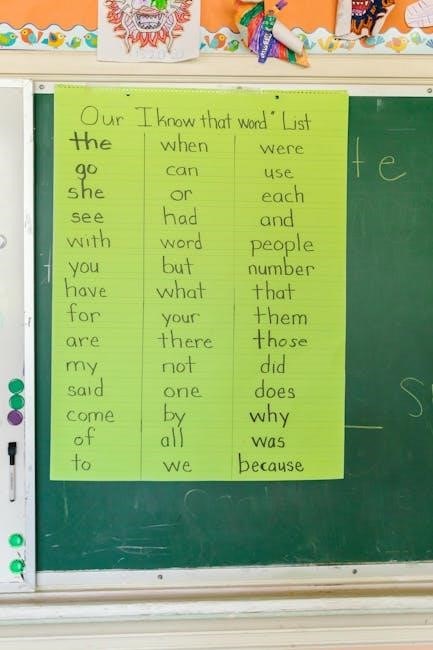The 30-Day Vocabulary Challenge offers a structured plan to enhance your vocabulary in just a month. Designed for all levels, it provides daily exercises and proven strategies to boost word knowledge, making learning manageable and enjoyable.
Why Building a Strong Vocabulary Matters
A strong vocabulary is a cornerstone of effective communication and intellectual growth. It enhances both verbal and written expression, allowing individuals to convey ideas clearly and persuasively. A robust word bank also improves reading comprehension, enabling deeper understanding of complex texts. Successful people often attribute their achievements to a superior vocabulary, as it fosters confidence and precision in personal and professional interactions. Expanding your vocabulary is not just about academics; it’s a lifelong skill that opens doors to new opportunities. By dedicating time to learn new words, you invest in your future, gaining the ability to articulate thoughts more effectively. This habit of collecting words becomes a powerful tool for self-expression and problem-solving, making it an essential pursuit for anyone striving for success.
Overview of the 30-Day Plan
The 30-Day Vocabulary Challenge is a structured program designed to help individuals expand their word knowledge in just one month. The plan is divided into daily lessons, each focusing on learning and retaining new words. It incorporates exercises, quizzes, and contextual examples to ensure practical application. The downloadable PDF guide, “30 Days to a More Powerful Vocabulary,” serves as the core resource, offering a comprehensive approach to vocabulary building. The program emphasizes consistency and engagement, with activities tailored to fit into a busy schedule. By the end of the challenge, participants can expect noticeable improvement in their ability to communicate effectively and think critically. The plan is flexible, catering to learners of all levels, from beginners to advanced students.

Daily Routine for Vocabulary Growth
Commit to a daily routine of learning new words, using flashcards, and reading to apply them in context. Repetition and consistent practice are key to building vocabulary.
Learning New Words Every Day
Learning new words daily is essential for vocabulary growth. Start with 5- each day, using resources like the 30 Days to a More Powerful Vocabulary PDF. Focus on words with multiple meanings and common usage. Use flashcards to reinforce memory, writing the word on one side and its definition on the other. Review words regularly, especially those that challenge you. Understanding context is crucial, so practice using words in sentences. This daily habit ensures steady progress and makes vocabulary building manageable. Over time, this routine will expand your lexicon, improving communication and comprehension skills effectively.
Using Flashcards Effectively
Flashcards are a powerful tool for vocabulary building. Write the word on one side and its definition, pronunciation, and usage on the other. Review them daily, focusing on challenging words. Digital apps like Anki or Quizlet offer spaced repetition, enhancing retention. Physical cards can be carried anywhere, making learning convenient. Test yourself actively—don’t just read; recall meanings from memory. Use mnemonics or associations to link words to memories or images. Track progress and revisit difficult words frequently. Flashcards simplify the process of learning new words, ensuring steady growth in your vocabulary over the 30-day challenge. Consistency is key to making this method effective and long-lasting.
Reading and Contextual Learning
Reading is a cornerstone of vocabulary growth, as it exposes you to words in context, making them easier to understand and remember. By immersing yourself in various texts—books, articles, or news—you encounter new words naturally. Pay attention to how words are used in sentences, as context often provides clues to their meanings. Discuss unfamiliar words with others to deepen comprehension. Additionally, keeping a vocabulary journal to note new words and their definitions can reinforce learning. This method not only expands your vocabulary but also improves reading comprehension and overall communication skills, essential for lifelong learning and personal growth. Consistent reading habits, combined with active engagement, are key to mastering new words effectively.

Strategies for Memorizing Words
Utilize visual methods like mind maps or flashcards, employ mnemonics, and leverage apps for interactive learning to memorize words effectively in your 30-day challenge.
Association Techniques
Association techniques are powerful tools for memorizing words. By linking new words to personal experiences, emotions, or familiar objects, you create mental connections that enhance retention. For instance, associating a word with a vivid image or a memorable event can make it easier to recall. This method leverages the brain’s natural ability to remember information tied to emotions or sensory experiences. Over the 30-day challenge, practice creating unique associations for each word, ensuring they are meaningful and personal. This approach not only aids in memorization but also makes learning engaging and enjoyable, helping you build a robust vocabulary efficiently.

Repetition and Spaced Learning
Repetition and spaced learning are essential for effective vocabulary acquisition. By revisiting words at increasing intervals, you reinforce memory and improve retention. Start with daily reviews, then gradually extend the gaps between sessions. This method ensures words move from short-term to long-term memory. Combine this with active recall, where you test yourself without looking up definitions. Flashcards are a great tool for this process. Consistency is key—dedicate a few minutes each day to review and practice. Over the 30-day challenge, this approach will help you build a strong foundation and master new words efficiently. Regular practice and systematic repetition are proven to enhance vocabulary retention and fluency.
Visual and Mnemonic Methods
Visual and mnemonic techniques are powerful tools for memorizing vocabulary. By associating words with images, diagrams, or personal experiences, you create vivid mental connections that enhance retention. Mnemonics, such as acronyms or rhymes, help encode words in a memorable way. For example, creating a mind map with word associations or drawing pictures that represent meanings can make learning more engaging. These methods leverage the brain’s ability to recall visual and emotional cues, making complex words easier to remember. Incorporate these techniques into your daily routine to boost your vocabulary acquisition and retention over the 30-day challenge. Visual and mnemonic strategies add variety to your learning process and keep it enjoyable while improving long-term memory.

Resources for Vocabulary Building

Utilize books like “Word Power Made Easy” and “30 Days to a More Powerful Vocabulary” for structured learning. Explore online tools and apps designed to enhance vocabulary through interactive exercises and games, ensuring a comprehensive approach to word mastery.
“Word Power Made Easy” by Norman Lewis
Norman Lewis’s Word Power Made Easy is a renowned resource for vocabulary building, offering a systematic approach to mastering words. The book focuses on word roots, prefixes, and suffixes, enabling learners to decipher meanings logically. It emphasizes understanding words in context, with practical exercises and examples to reinforce learning. This book is particularly effective for those preparing for exams or seeking to enhance their professional communication skills. Its clear structure and engaging style make it accessible for learners of all levels. By incorporating this resource into your 30-day challenge, you can build a strong foundation and develop a deeper understanding of English vocabulary. It complements daily learning routines and provides long-term benefits for language mastery.
The 30 Days to a More Powerful Vocabulary PDF is a structured guide designed to help you enhance your vocabulary in just one month. It provides a daily breakdown of words to learn, complete with definitions, usage examples, and exercises to reinforce retention. The guide focuses on high-impact words that are commonly used in professional and academic settings. Each day’s lesson is concise, making it easy to fit into a busy schedule. The PDF also includes quizzes and progress tracking tools to keep you motivated. By following this plan, you can significantly improve your communication skills and expand your linguistic toolkit. It’s an excellent resource for anyone looking to build a strong vocabulary quickly and effectively.
Online Tools and Apps
Supplement your vocabulary journey with online tools and apps designed to make learning engaging and efficient. Apps like Duolingo, Quizlet, and Memrise offer interactive lessons, flashcards, and games to help you master new words. Many of these platforms provide personalized learning plans, progress tracking, and spaced repetition systems to ensure long-term retention. Additionally, apps like Vocabulary.com and Word Hippo offer comprehensive word lists, definitions, and example sentences. These tools are accessible on-the-go, making it easy to fit vocabulary practice into your daily routine. By leveraging technology, you can stay motivated and accelerate your progress in the 30-Day Vocabulary Challenge;
Tracking Progress and Staying Motivated
Regularly assess your word knowledge and celebrate small achievements to stay driven. Use interactive tools and positive reinforcement to maintain enthusiasm throughout the 30-day journey;
Setting Realistic Goals
Establishing clear, achievable objectives is key to staying motivated throughout the 30-day challenge. Start by defining how many words you aim to learn daily, ensuring the target is manageable. Divide the 30-day plan into weekly milestones, focusing on mastering a set number of words each week. Prioritize understanding and retention over quantity, allowing time for revision and practice. Align your goals with your personal reasons for improving vocabulary, whether for exams, professional growth, or personal enrichment. Track your progress and adjust goals as needed to maintain momentum. Celebrate small victories to stay motivated and remind yourself of the long-term benefits of a stronger vocabulary.
Using a Vocabulary Journal
A vocabulary journal is a powerful tool for tracking and reinforcing your progress in the 30-day challenge. Dedicate a notebook or digital document to record new words daily, along with their meanings, synonyms, antonyms, and example sentences. Write down how you encountered the word and why it’s important to you. Reviewing your journal regularly helps solidify memories and improves retention. Organize entries alphabetically or by themes like weekdays or categories (e.g., emotions, food). Reflecting on your journal at the end of the week can reveal patterns in word usage and areas needing more practice. Consistent use of a vocabulary journal fosters accountability and deepens your connection with the words you learn.
Celebrating Milestones
Celebrating milestones is a key motivator in the 30-Day Vocabulary Challenge, helping you stay encouraged and track your progress. Acknowledge achievements like mastering 10 new words, completing a week, or using a word in conversation. Reward yourself with small treats or activities that bring joy. Reflecting on milestones boosts confidence and reinforces the habit of learning. Share accomplishments with friends or a study group to enhance motivation. Milestones remind you of growth and keep you committed to the challenge. Regular celebrations make the journey enjoyable and highlight the tangible results of your efforts. This positive reinforcement is crucial for sustaining momentum and reaching your vocabulary goals.
The Impact of Vocabulary on Communication
A robust vocabulary enhances clarity, precision, and persuasiveness in both verbal and written communication, fostering better understanding and stronger connections in personal and professional relationships.
Enhancing Verbal and Written Communication

A robust vocabulary is instrumental in refining both verbal and written communication, enabling individuals to articulate ideas with precision and clarity. Expanding your word repertoire allows for more nuanced expression, making conversations more engaging and writings more impactful. The 30-Day Vocabulary Challenge emphasizes learning and applying new words, which strengthens communication skills by enhancing the ability to convey thoughts effectively. This, in turn, fosters better understanding and connection in personal and professional interactions. By mastering vocabulary, individuals can communicate confidently, ensuring their messages are conveyed accurately and persuasively in both spoken and written forms.
Building Confidence in Conversations
Expanding your vocabulary through the 30-Day Challenge fosters confidence in conversations, allowing you to express ideas articulately and assertively. Knowing the right words to use reduces hesitation and uncertainty, making interactions smoother and more meaningful. As you master new terms, you’ll feel more comfortable engaging in discussions, whether casual or professional. This confidence boost translates into clearer communication, helping you project authority and sincerity. Over time, the ability to articulate thoughts with precision enhances your overall self-assurance, making you a more compelling and effective communicator in all aspects of life.

Advanced Vocabulary for Specific Needs
The 30-Day Challenge offers tailored vocabulary lists for specific goals, such as academic success, professional advancement, or exam preparation, ensuring focused and relevant learning.
Academic and Professional Vocabulary

The 30-Day Challenge includes targeted lists of words essential for academic and professional environments, helping users navigate complex texts and excel in workplace communication. These words are selected to enhance clarity, precision, and authority in writing and speaking. For students, this vocabulary aids in understanding scholarly articles and producing polished essays. Professionals benefit by conveying ideas more effectively in meetings, reports, and presentations. The curriculum focuses on high-utility terms frequently encountered in fields like business, technology, and science. By mastering these words, participants gain a competitive edge, enabling them to articulate their thoughts with sophistication and confidence. This section is designed to bridge the gap between general knowledge and specialized terminology, ensuring practical application in real-world scenarios.
Vocabulary for Standardized Tests
The 30-Day Challenge dedicates a section to vocabulary tailored for standardized tests like the SAT, GRE, GMAT, and LSAT. These exams often include high-difficulty words that test comprehension and usage. The program provides targeted word lists, focusing on terms frequently appearing in test materials. Users learn to recognize and apply words in contexts similar to those on actual tests. Techniques such as mnemonics and context-based learning are emphasized to aid retention. This section is designed to improve scores by familiarizing participants with the specific vocabulary demands of these exams. By mastering these words, individuals gain confidence and reduce test anxiety, ensuring they can express their ideas clearly and accurately during high-stakes assessments.
Long-Term Benefits of the Challenge
Enhanced communication skills, improved reading comprehension, and increased language fluency are lasting outcomes. The challenge fosters lifelong learning habits, boosting personal and professional growth effectively and sustainably.

Improving Reading Comprehension
Expanding your vocabulary significantly enhances reading comprehension by enabling better understanding of complex texts. Learning new words helps you recognize and interpret unfamiliar terms, allowing you to grasp the author’s intended meaning. A stronger vocabulary reduces the need to pause and look up words, making reading smoother and more efficient. This improvement is especially beneficial for academic and professional materials, where precise language is often used. Over time, the ability to comprehend challenging texts becomes second nature, fostering a deeper enjoyment of reading. The 30-day challenge provides a structured approach to building this skill, ensuring long-term improvement in how you process and understand written content.
Mastering Language Fluency
Mastering language fluency involves not just knowing words but using them effortlessly in communication. The 30-day vocabulary challenge helps bridge this gap by integrating new words into your active vocabulary. As you learn and practice words daily, you’ll notice improved ease in expressing ideas. This fluency enhances both verbal and written communication, allowing you to convey thoughts more clearly and persuasively. Over time, you’ll rely less on pauses to find the right words, making conversations more natural and confident. The challenge also refines your ability to use context clues, ensuring words are used appropriately. This leads to a smoother, more articulate communication style, making you a more effective and engaging speaker and writer.
Lifelong Learning Habits
The 30-Day Vocabulary Challenge fosters lifelong learning habits by encouraging consistent practice and curiosity. Beyond the initial 30 days, participants often adopt a mindset of continuous improvement, seeking new words in everyday contexts. This habit cultivates a deeper appreciation for language and its nuances. By incorporating vocabulary growth into your routine, you’ll develop a sustainable approach to learning that extends far beyond the challenge. Tools like the “30 Days to a More Powerful Vocabulary PDF” provide a foundation, but the real value lies in maintaining the habit. Over time, this practice sharpens your mind and keeps your language skills dynamic, ensuring you remain engaged and motivated to learn for years to come.
